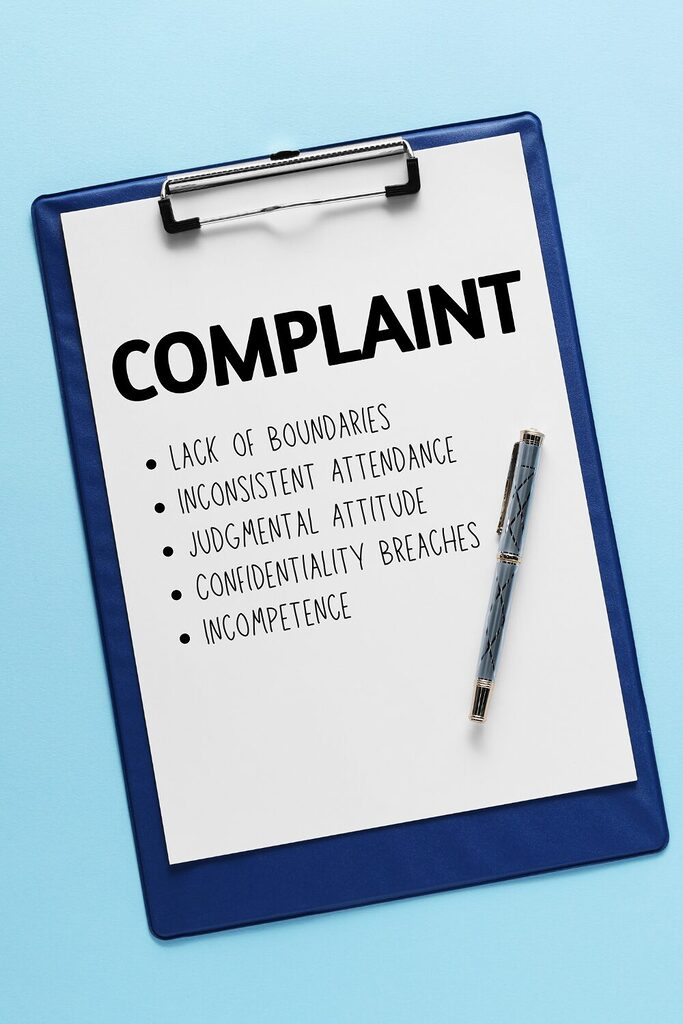A bad therapist can significantly hinder a client’s progress and well-being. They might exhibit behaviors such as being judgmental, dismissive, or unempathetic, leading clients to feel invalidated or misunderstood.

Recognizing A Bad Therapist
The first step in addressing unprofessionalism is recognizing it. A bad therapist’s behavior can manifest in various ways, from breaches of confidentiality to inappropriate personal conduct. Some signs to watch for include:

Lack of Boundaries
A therapist should maintain a professional distance. If they share too much about their personal life, try to establish a friendship, or engage in any form of romantic or sexual behavior, it’s a red flag.
Inconsistent Attendance
Frequent cancellations, tardiness, or the therapist appearing distracted during sessions can indicate a lack of commitment to your care.
Judgmental Attitude
Therapists are there to support and guide, not to judge. If you feel belittled, shamed, or criticized for your feelings or experiences, it’s time to reassess the relationship.
Confidentiality Breaches
Your privacy is paramount. If your therapist discusses your case with others without your explicit consent, it’s a serious violation of trust. It also goes the other way–he should not be discussing other clients with you.
Incompetence
Sometimes, a therapist might lack the necessary skills or knowledge to address your issues effectively. This can be as damaging as overt unprofessional behavior.
Steps to Take
If you find yourself dealing with a bad therapist, taking action is essential. Here are steps you can follow to protect yourself and ensure your mental health remains a priority:
Trust Your Instincts
If something feels off, trust your gut. You are the best judge of your comfort and safety in the therapeutic relationship.
Document Everything
Keep a detailed record of any incidents that raise concerns. Note the date, time, and nature of the behavior. This documentation can be crucial if you need to escalate the issue.
Address the Issue Directly
If you feel safe doing so, consider discussing your concerns with your therapist. Sometimes, unprofessional behavior can stem from misunderstandings or a lack of awareness. A frank conversation might resolve the issue.
Seek a Second Opinion
Consulting another mental health professional can provide clarity. They can offer an objective perspective and advise on whether the behavior you’ve experienced is indeed unprofessional.
Report to Licensing Boards
If the behavior is egregious, filing a complaint with the therapist’s licensing board is a necessary step. These boards are responsible for maintaining professional standards and can take disciplinary action if warranted.
Find a New Therapist
Your mental health is too important to compromise. If you cannot resolve the issue, prioritize finding a new therapist who meets professional standards and makes you feel safe and supported.
Self-Care in Transition
Transitioning away from an unprofessional therapist can be emotionally taxing. Here are some self-care tips to help you through this period:

Allow Yourself to Feel
It’s normal to feel a range of emotions, from anger to sadness to relief. Give yourself permission to process these feelings without judgment.
Lean on Support Networks
Friends, family, or support groups can provide the emotional backing you need. Don’t hesitate to reach out and share your experiences with trusted individuals.
Practice Self-Compassion
Be kind to yourself. Remember that seeking help was a brave step, and recognizing unprofessional behavior shows your commitment to your well-being.
Engage in Relaxing Activities
Engage in activities that bring you joy and relaxation, whether it’s reading, hiking, or practicing mindfulness. These can offer a reprieve from the stress of the situation.
Moving Forward
Finding a new therapist might seem daunting, but it’s a crucial step in your mental health journey. Here are some tips to ensure your next experience is positive:
Research Thoroughly
Look for therapists with good reviews, proper credentials, and a specialization that matches your needs.
Ask Questions
During initial consultations, ask about their approach, confidentiality policies, and any other concerns you have. A good therapist will welcome your questions and answer them openly.
Trust the Process
Building a therapeutic relationship takes time. Be patient with yourself and the process, and remember that finding the right fit can make all the difference.
Final Thoughts
Dealing with a bad therapist is challenging, but it’s crucial to remember that your mental health deserves the utmost care and respect. By recognizing unprofessional behavior, taking appropriate steps, and prioritizing self-care, you can navigate this difficult situation and find the support you need.
Your journey to mental wellness is important, and with the right help, it’s more than achievable. Stay strong, stay informed, and most importantly, stay committed to your well-being.
Mental Health in the Workplace
Mental health in the workplace is a critical aspect of overall well-being and organizational success.
Understanding Types of Stigma: Mental Health Challenges
Types of Stigma Stigma surrounding mental health remains a significant barrier to seeking help, accessing treatment, and achieving recovery for many individuals.
Child and Adolescent Mental Health Challenges
Navigating the complexities of childhood and adolescence often can involve some mental health challenges, from anxiety and depression to behavioral disorders.
Mental Health Issues in Seniors
As individuals age, they may face various mental health challenges that can significantly impact their overall well-being.




